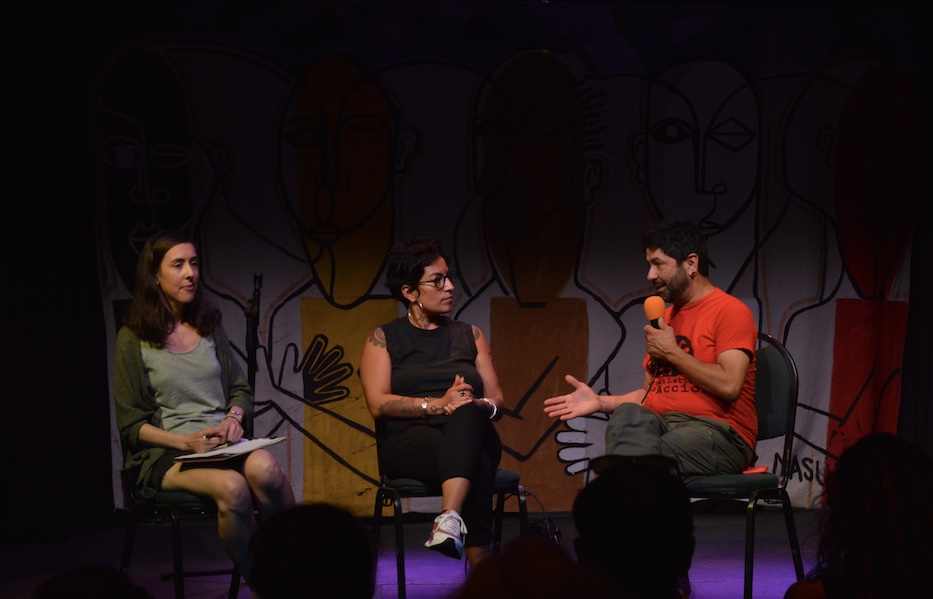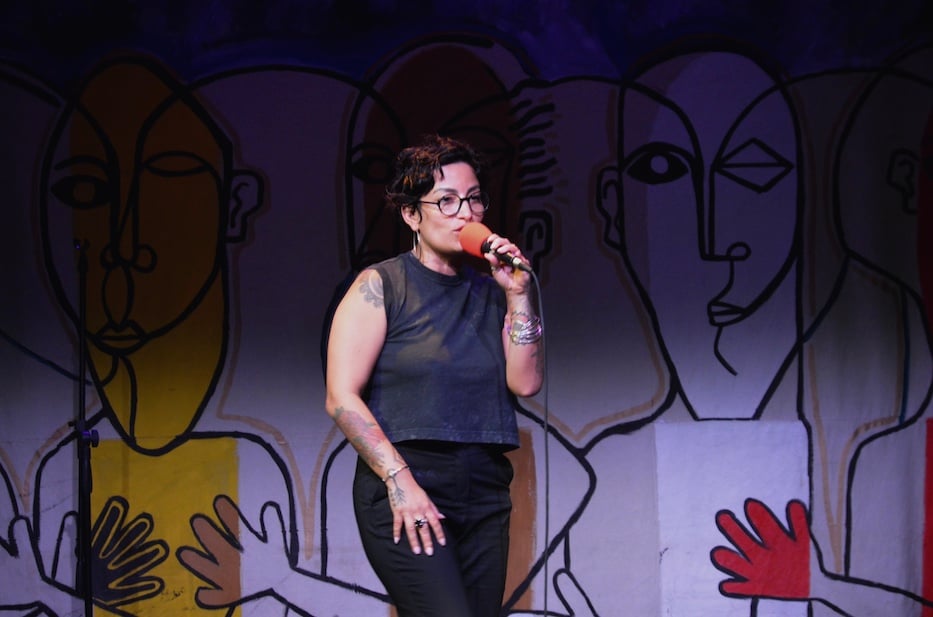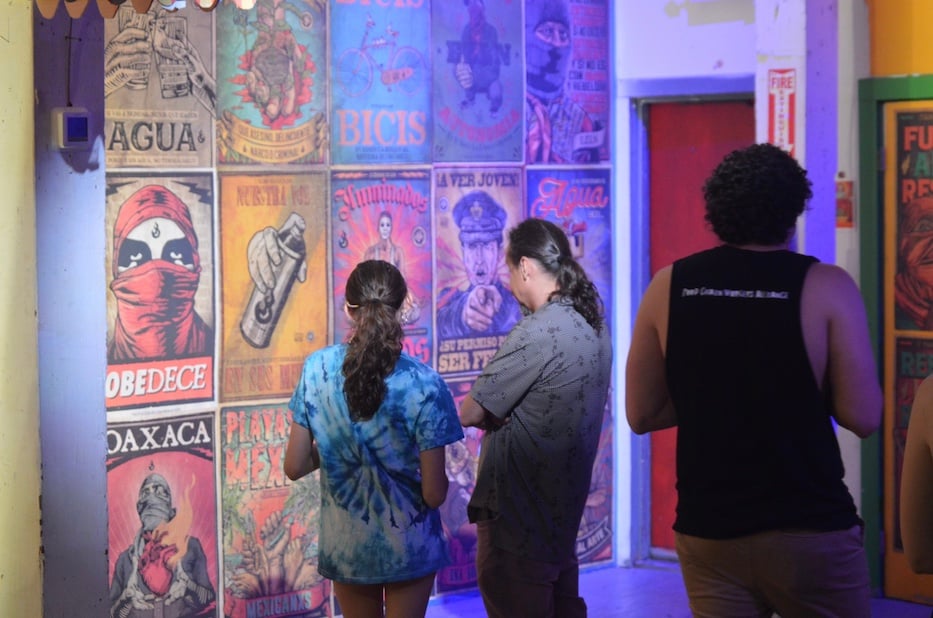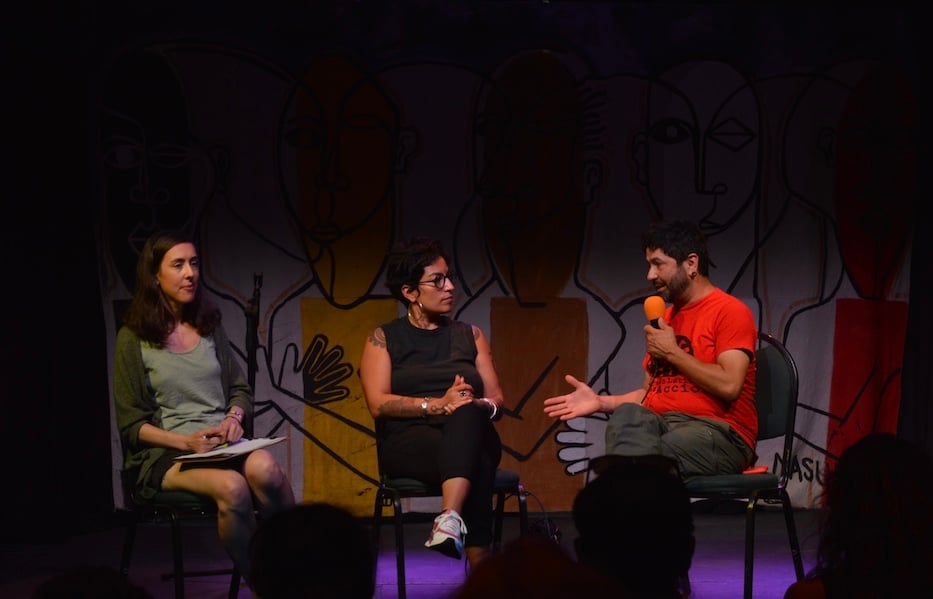
Culture & Community | Arts & Culture | Unidad Latina en Acción | Arts & Anti-racism

Hip-Hop artist Ana Tijoux. Kamini Purushothaman Photos.
Hip-Hop artist Ana Tijoux took the stage in an all-black ensemble with multicolored sneakers. “Woo woo woo!” she shouted, enthusiastically greeting her audience. The music to her breakout single, “1977,” began to play, and she gestured to the audience as the lyrics hit. In the autobiographical song, Tijoux sang about her own childhood and family history, infusing her verses with powerful notes of determination.
Sunday night, Unidad Latina en Acción (ULA) hosted Tijoux and other performing artists at Bregamos Theater to honor its 21 years of service as an immigrant advocacy group. In the past two decades, ULA has worked with hundreds of newcomers to New Haven, fought and won labor cases and instances of wage theft, helped advocate for and institute the Elm City ID Card, worked with sanctuary congregations across the city, and advocated for stronger rights and protections for immigrant people and families in Connecticut and the U.S.
“Art accompanies us during our struggles,” Tijoux said through Megan Fountain, ULA’s coordinator of advocacy and partnerships who doubled as a a translator for the evening. “We need to keep building these spaces. We’re seeing these spaces all over the world, and these are the spaces where we’re gonna grow our power.”

It was a particularly pertinent sentiment given that the theater’s name, Bregamos, literally means “struggle” (or as owner and founder Rafael Ramos sometimes says, “By hook or by crook”). As guests of all ages filtered into the theater, a familiar sign for “La Bodega” and several paintings that live in the space greeted them. Vendors served Latin American foods, from empanadas to pastel de choclo.
“Oh, this is really, really good,” said one attendee after taking a bite of his empanada.
One woman sold handmade jewelry, including beaded bracelets with evil-eye charms and ornate chandelier earrings. Near the theater’s entrance, a donation box gave guests the ability to support the vendors, with funds that went directly to the artists and cooks who donated their skills to help the concert come alive. Across from the box, copies of El Molino Informativo’s most recent issue of El pueblo hablando rested on a table, filled with information about labor rights for Indigenous women in the United States.
On the far wall of the theater hung posters designed by Mexican graphic designer Gran Om. He also designed the flier for the concert, a powerful portrayal of Tijoux and the other artists created with contrasting hues of orange and teal.

Megan Fountain, hip-hop artist Ana Tijoux, and John Jairo Lugo.
ULA’s community organizing director, John Jairo Lugo, discussed immigration, justice, and protest with Tijoux in an open conversation that Fountain translated for.
As the two spoke, Lugo stressed the power of art in social movements. “Our political education came from music, not from books,” he said, noting the art form as a galvanizing force of revolutionary instruction.
Tijoux pointed to Chilean Folk singers Violetta Parra and Victor Jara, who “created works of art for humanity that continue to resonate.” Emphasizing their relevance, she added that “In Chile, if you see people who like to listen to heavy metal, they still know those critical folk songs from the 1970s. They continue to reinterpret those songs. Those songs have a long life.”
Lugo drew attention to a recent reform under the Biden Administration that streamlines the process to apply for deferred action for undocumented immigrants who speak out against labor abuse. The immigration relief provided by the policy would protect certain individuals from deportation.

Mentioning that Biden is yet to make a public announcement about it, Lugo asked Tijoux if she would urge him to do so. In response, she joked, “Sure, I’ll call Biden on my cell phone right now.”
“Do you think he cares what I say?” Tijoux asked, adopting a more serious tone. “No!” yelled someone from the crowd in response.
“Do you think he even cares what the president of Chile would say?” Tijoux continued. ‘‘The people who are in power don’t care about what we are living everyday.’’
“The only real democracy that exists here is the democracy that you’re creating when you take the streets and you protest, in your high school, in your neighborhood,” she concluded, highlighting the importance of homegrown democracy. “That’s the real hope for humanity.”
For Sunday’s performers, protest came in many forms—chief among them creative expression.
Rodrigo Starz, a Bronx-raised rapper of Chilean descent, opened the show. Performing verses about national and international injustices, he repeated the refrain, “We need a people’s rebellion.” One song began with audio sampled from a Black Panther rally, another allusion to the themes of resistance Starz explored.
Returning to Tijoux’s message of creating progress from a small scale and upwards, Starz included bars about staying spirited and hopeful.
“Welcome to the world of a working class rapper,” he cheerily vocalized in one song. “I’m not afraid to say the things that really matter.” After bringing his son on stage, the two rapped back-and-forth together. The crux of the set came when his son wooed the crowd with his breakdancing.
Hordatoj performed next, delivering incisive rhymes with unwavering rhythm. When his microphone briefly cut out, he switched it out for a nearby mic with ease, working the mishap into his suave display. Then, the audience waited in anticipation for the show’s headliner.
With her high-energy rap-verses, upbeat dancing, and immersive vocals, Tijoux created a world of her own within the space. Guests sang along and danced with each other, chanting and swaying along to the beat. They clapped their hands, tapped their feet, and even drummed against a paint can to the beat of the music.
Ending her set with an a cappella performance, the only feat more impressive than the notes Tijoux hit was how long she held them for. Captivating attendees of all ages, Tijoux delivered a performance that would surely live on in the minds of the crowd, who cheered loudly as she finished singing.
Following her performance, guests conversed amongst the crowd, noting the beauty of Gran Om’s posters and lauding Tijoux’s stage presence. A photographer earnestly asked attendees what they thought about the concert, eager to share his own praises.
A fervent spirit hung in the air as the exuberant night came to a close, Tijoux’s words of empowerment, both from her conversation with Lugo and from her own set, still echoing through the theater.
“We are the only solution to the grotesque, humongous, power system that is oppressing so many people worldwide,” she said. “Let’s do it for our children, for our grandchildren, with our hearts.”

